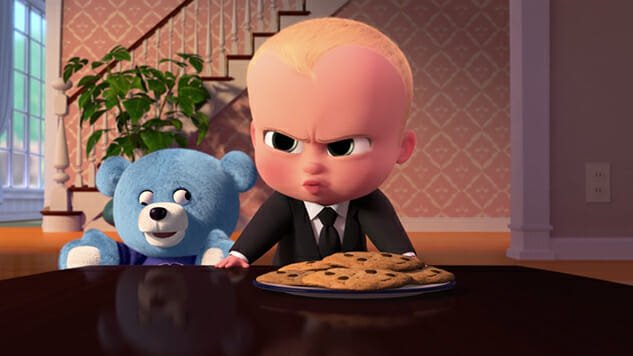Cookies Are for Closers: An Apologia for The Boss Baby

By all accounts, Tom McGrath’s The Boss Baby is a bizarre film. It imagines that the horror of displacement from the center of one’s family is analogous to corporate takeover (with new babies churned along on a conveyor belt, a select few chosen for “upper management”); that capitalism is so entrenched in the way we think and operate it shapes how we view conception; and that the selfishness of babies is comparable to the dispassionate self-interest of the Suits. Still, most poignantly, it dissects not only how we feel about validation, but how we prioritize it. Its recent Academy Award nomination has sparked skepticism, but perhaps its vivacity and emotional acumen make it both deserving of its nod, and one of the best animated films to come down the line in years.
When the arrival of a younger brother (Alec Baldwin as Theodore, though the movie mostly refers to him as the Boss Baby) upends seven-year-old year old Tim Templeton’s (Miles Christopher Bakshi) domestic life—once filled with phantasmagorically imaginative episodes of adventure for only him and his parents—Tim initially sets out on a quest to mark his territory. Unused to the attention not being on him, he butts heads with his new baby sibling, and the two vye for their parents’ (Jimmy Kimmel and Lisa Kudrow) attention. The Boss Baby looks like a manager, an uncompromising force all suited up, and the tension between the two reaches a detente when the Boss Baby reveals his identity and his mission: He is an undercover manager from BabyCo (where babies come from!) sent to Earth to recenter love and attention on babies because scientifically manufactured young pet animals have become a threat to the status quo. It is both a comedy of sibling rivalry and a corporate espionage film—The Pelican Brief for kids.
It wouldn’t be inappropriate to compare the Boss Baby to Jack Donaghy (also Alec Baldwin): fairly conservative by nature, driven by a sort of big business efficiency which only makes sense in the context of a world driven by qualitative and measurable success. If Donaghy’s goal was always to be President at NBC, the Boss Baby’s is to become the ultimate Boss Baby. Donaghy’s a baby in a suit, fussy and used to having his demands met at any time, regardless of their ridiculousness. Even if you don’t know who Jack Donaghy is, that is the joke: Older executive types are identically propelled by such a similar kind of selfishness and self-interest that they can, as the film argues, only be delineated by how they use their money. The core of The Boss Baby resembles Donaghy’s emotional arc in the final season of 30 Rock, in that it’s a narrativization of the old adage that “the man who has everything has nothing.”
Jack Donaghy realizes that he’s not actually that happy now that he’s at the top (he is, as Liz Lemon [Tina Fey] says, a man with a nice voice and a drinking problem); the Boss Baby, too, feels an emptiness in a role where power gives him so little joy. The Boss Baby only has a wall of portraits to provide the idea of a reachable goal, and an idol and role model in Super Colossal Big Fat Boss Baby, a former CEO-type of BabyCo. Somewhat alienated from “normal babies” in the title sequence, wherein he doesn’t laugh like the others and is altogether resistant to the prospect of the messiness of toddler and family life, the Boss Baby’s arc continues to reveal that without the job, or the goal of being the next CEO, there’s little else that he has to hold onto. The Boss Baby’s objective is only material in a minimal sense: the corner office and a private potty. The Boss Baby makes an explicit choice to contextualize this desire, in Tim’s imagination or not, as existing within a particular system of hierarchy where people can be forced out not only by other peers in competition, but by products. PuppyCo, both of their parents’ place of employment, is a corporation wherein cuteness is commodified, with the introduction of a new hybrid puppy a tool to monopolize people’s love for children.
-

-

-

-

-

-

-

-

-

-

-

-

-

-

-

-

-

-

-

-

-

-

-

-

-

-

-

-

-

-

-

-

-

-

-

-

-

-

-

-








































